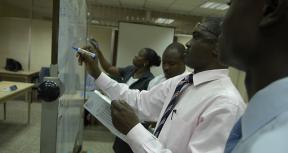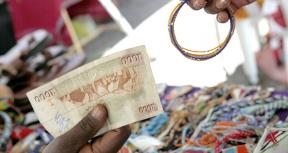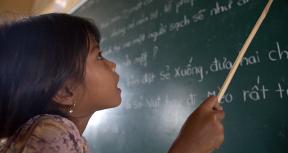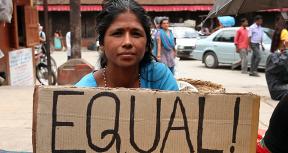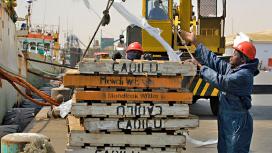Inclusive and Sustainable Economic Growth
- The World Bank Group provided considerable and multiproduct support to several UMICs to address the most critical vulnerabilities of the countries’ financial sectors, though in some cases making projects beneficial to the poor remained a challenge. The World Bank Group’s role in the development of new capital markets instruments was influential, but also constrained in many cases by the existing development level of client countries’ markets.
- In contrast to the IBRD, IFC support to numerous UMICs before and during the financial crisis happened to be largely procyclical.
Fiscal and Financial Sector Resilience
- The World Bank Group helped UMICs build resilience and cope with the global economic crisis, especially through fostering countercyclical policies and, to a lesser extent, strengthening public sector institutions.
- The 2007–08 global economic crisis was a major test of fiscal and financial sector resilience in UMICs, and World Bank support through development policy loans (DPLs) focused on fiscal management attenuated a more contractionary response than would otherwise have occurred.
Public Financial Management, Civil Service Reform, and Anticorruption
- World Bank lending in the UMICs was especially important in fostering countercyclical policies and strengthening public sector institutions, particularly in the area of public finance. Several evaluations recognized the need to keep lending space at the country level to respond credibly to future crises.30 The magnitude of the institutional challenges that UMICs continue to face as they aspire to high income status underscores the need for World Bank long-term engagement and support in this area.
Industrial Competitiveness, Innovation, and Investment Climate Reforms
- Improving global competitiveness and creating new jobs are among the core challenges facing many UMICs, associated with a need to shift to a new developmental model that would rely on a different set of growth drivers. This report concludes that broad trends in cross-country comparative competitiveness performance show significant gaps in average competitiveness indicators between high-income countries (HICs) and MICs, especially for technological readiness and innovation.
- World Bank Group support to improve competitiveness and innovation was largely relevant, but the design and implementation of its interventions were often at the sector level, failing to address the systemic weaknesses of innovation ecosystems that hinder competitiveness at the country level.
- World Bank Group support for investment climate reforms has been comprehensive, but measuring its effectiveness and attributing impact on investment, jobs, business formation, and growth has often been challenging. Several IEG evaluations show that the World Bank Group has had difficulties in helping its higher-income clients alleviate binding constraints in business environments, often because of political economy constraints.
Public-Private Partnerships in Infrastructure
- World Bank Group support in UMICs often created a market for public-private partnerships (PPPs) through their demonstration effects and helped shape the regulatory environment for PPPs, though data on their effects on the poor are scarce.
- Regarding more traditional infrastructure investment projects, the World Bank Group portfolio in UMICs contains many examples of triggering critical policy reforms and achieving significant sector-wide impact even with modest financing.
Investing More Effectively in People
- Overall, the evaluative evidence suggests that World Bank Group engagement in investing in people and quality of life (education, health, social protection, urban sectors, and employment creation programs) added value in the UMICs. It helped countries adopt new or innovative programs and adapt and fine-tune existing programs to enhance their effectiveness, and enabled knowledge transfer. The World Bank’s strategic assessment of where progress was slow and needed to accelerating drove the program in some UMICs, but it mostly reflected the areas in which governments wanted World Bank support.
Social Safety Nets
- Conditional cash transfers seem to be among the most successful and transformative programs the World Bank supported, including in UMICs. Social safety nets (SSNs) were important in mitigating the impact of crises on the most vulnerable. UMICs had strong demand for World Bank support in this area, which evolved from project support to a focus on building SSN systems and institutions.
Quality of Education and Health, and Pandemic Response
- World Bank support for education in UMICs focused on second-generation issues, such as early childhood education and enhanced quality outcomes, because many UMICs made major progress in resolving the first-generation education issues of access for all and gender equality.
- Health financing was a major focus of World Bank support in the UMICs, including support for risk pooling to increase the poor’s participation and concurrent steps to subsidize their enrollment. Furthermore, progress in addressing communicable diseases in most UMICs and rising life expectancy shifted the focus to noncommunicable diseases. Instead of supporting programs focused on addressing particular disease vectors, the World Bank supported building the quality of the health care system to address noncommunicable diseases.
- The World Bank also provided support to UMICs in coping with pandemics, particularly avian influenza.
Employment Creation Programs
- Evaluative evidence on results in employment and job creation programs is limited. The design of only a few World Bank Group interventions specifically addressed job creation, and those that IEG evaluated reportedly have limited effectiveness.
Access to Urban Services
- The World Bank supported a wide range of interventions designed to improve the quality of life in urban areas, including support for core urban services (electricity, water and sanitation, and transport), housing for lower-income groups, and even urban amenities and crime prevention in some cases. IFC contributed in this area through its investment in PPPs or privately owned urban service providers.
Gender Issues
- There is considerable scope to examine gender-related issues further in MICs and UMICs. A review of IEG’s evaluative evidence on the World Bank’s gender-related work in MICs found a lack of specific discussion of its performance in MICs or UMICs as income categories. However, the review found several interesting findings at the country level, though they are limited to the Latin America and Caribbean Region (Brazil, Chile, Mexico, and Colombia). Many MICs incorporated gender into country strategies, but outcomes were not assessed.
Fostering Resilience to Global Shocks and Threats
Environmental Sustainability, Natural Disaster Risk Reduction, and Climate change mitigation and adaptation
- The environment is a major World Bank Group engagement area in UMICs because many of these countries have experienced rapid growth that creates pressures on the physical environment. UMICs turned to the World Bank Group to take a catalytic role in mobilizing the necessary funds and helping build institutional capacity. The evaluative evidence also suggests that the World Bank was instrumental in supporting countries in addressing their commitments under various international agreements. However, IEG ratings for the achievement of outcomes in this pillar were lower than for other Global Practices, often highlighting systemic issues in the weak design and monitoring of results frameworks in the environment sector.
Fragility, Conflict, Violence, and Forced Displacement
- The development community has often linked fragility and conflict to lack of development progress. However, the number of violent conflicts in MICs (including many UMICs) has recently exceeded those in low-income countries (LICs), suggesting that conflict and violence are no longer primarily a LIC problem. The World Bank often had a positive role in addressing the most urgent issues, but IEG evaluations have emphasized that the World Bank Group strategic comparative advantage in situations of fragility, conflict, and violence remains in helping countries address essential, longer-term developmental challenges, such as chronic youth unemployment, rapid urbanization, and the like. An important lesson from experiences in Lebanon and Jordan (both UMICs) is that the World Bank urgently needs to develop financial mechanisms or fast-response facilities to use in similar situations in UMICs.
Knowledge Agenda
Building capacity for second-generation reforms
- World Bank Group programs in UMICs have shifted since the early 2000s toward more intensive delivery of knowledge services related to lending. IEG evaluations consistently emphasized the key role of the World Bank Group’s advisory and analytic work in supporting reforms in UMICs and the high value that country stakeholders in UMICs assigned to it. One of the most robust conclusions emerging from several evaluations is the importance of World Bank Group Advisory Services and Analytics in shaping the quality of the overall assistance, particularly in quality at entry of development policy financing—one of the main engagement instruments with the UMIC group. Maintaining a strong knowledge base through a steady flow of diagnostic work was an essential condition for effective support, particularly during crises. However, several IEG evaluations concluded that monitoring of World Bank knowledge services results in UMICs was weak for both individual activities and country programs. The World Bank’s analytical work often lacked explicit results frameworks, which diluted the focus on the most relevant development challenges.
Reimbursable Advisory Service (RAS)
- IEG evaluations emphasized RAS as an important mechanism to expand World Bank services, ensure the sustainability of the World Bank’s business model in UMICs, and generate new knowledge that the World Bank can then transfer to LICs. However, several IEG evaluations noted a tension between the World Bank’s mandate as a global development agency and the consultant firm model that it increasingly applies to deliver knowledge services through RAS. This tension often manifests itself in lack of coverage of sensitive but important areas, such as poverty diagnostics in UMICs or various aspects of governance.
Promoting South-South Knowledge Exchange
- Several IEG evaluations referred to the need to strengthen knowledge transfer and noted that although there are good examples in which World Bank knowledge activities facilitated South-South exchanges, excessive geographic, thematic, and organizational fragmentation prevents realizing the full potential of such exchanges. The World Bank could enhance knowledge exchanges through communities of practice, networks of practitioners, or knowledge hubs. The frequency of full dissemination of World Bank knowledge services was relatively low, conducted in slightly more than half of the knowledge activities reviewed. IEG evaluations noted that the World Bank could do more to ease the confidentiality of many knowledge activities conducted through RAS and leverage the technical capacity developed by UMICs to other countries.
Best Bet Keywords
Body Also See
Watch In Brief: Should the World Bank Group Work in Upple Middle-Income Countries?
Sub category
DOI
10.1596/IEG119055
Evaluation Reports Collection






